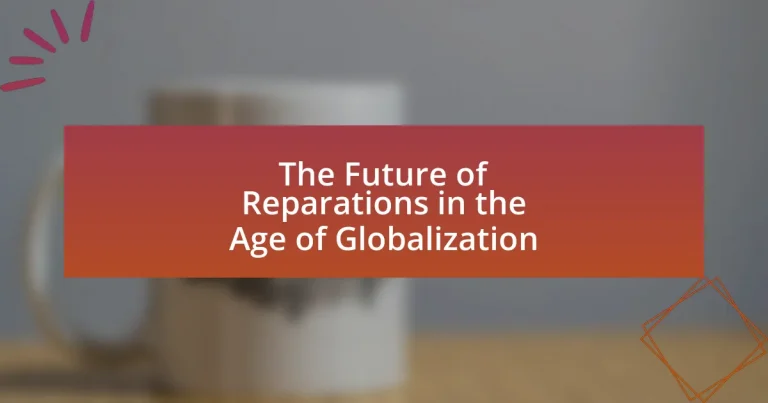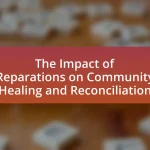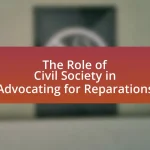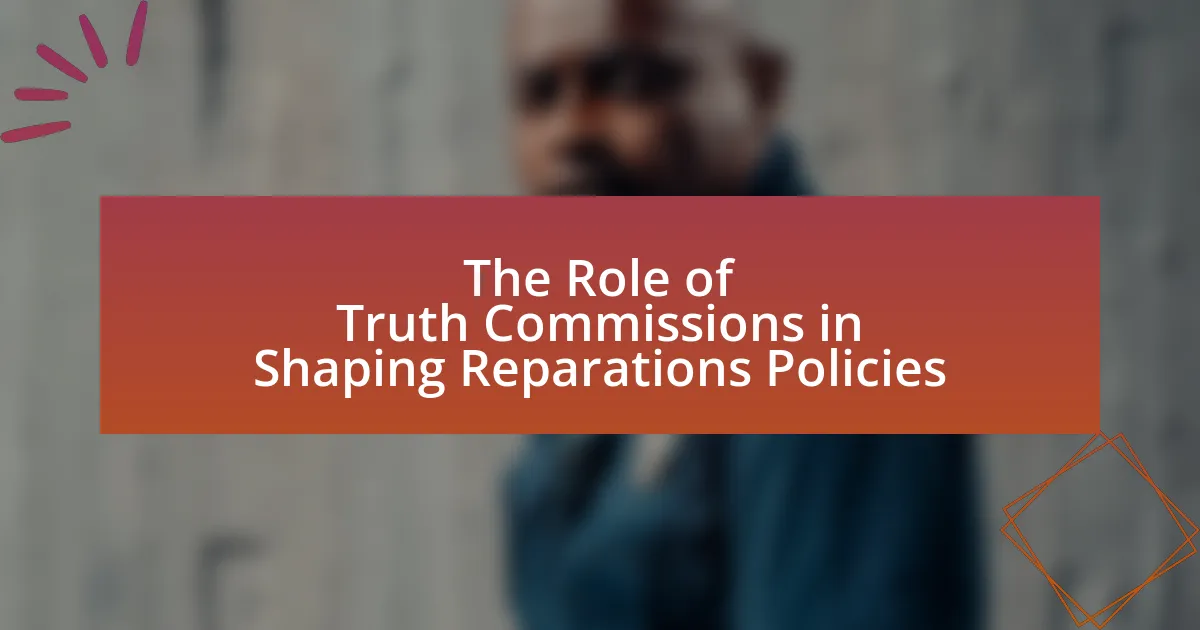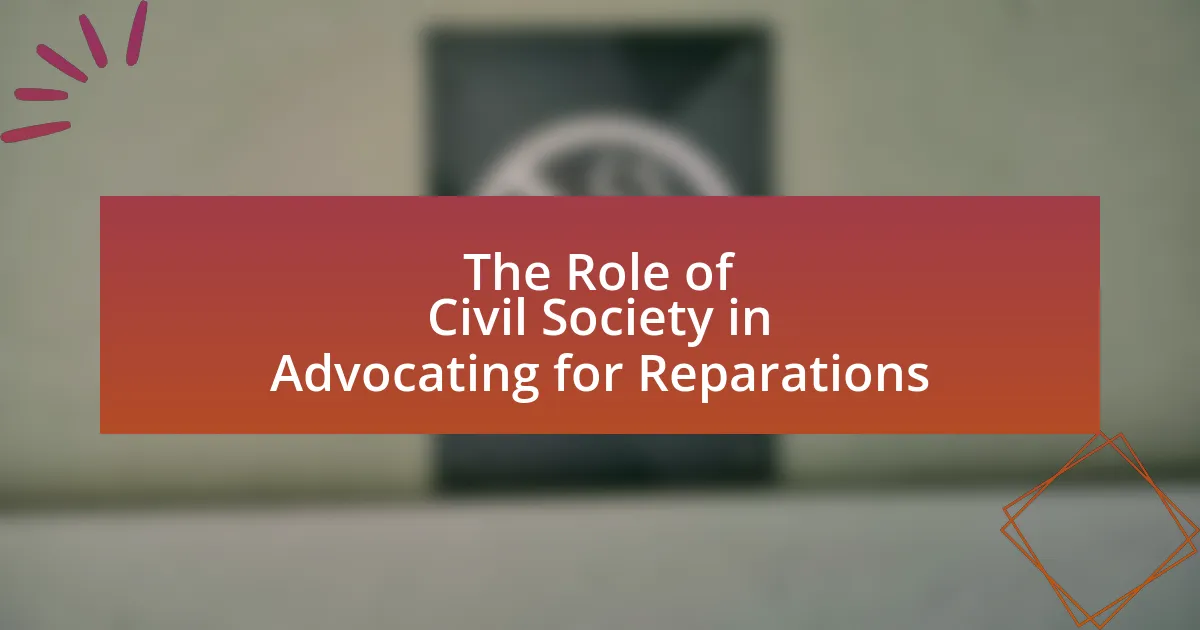Reparations in the context of globalization refer to compensatory measures aimed at addressing historical injustices and inequalities exacerbated by global economic systems. The article explores the relationship between reparations and historical injustices, highlighting significant events that have led to calls for reparations, such as slavery and colonialism. It examines cultural perceptions of reparations, the relevance of the discussion today, and the role of globalization in shaping the reparations debate. Additionally, the article addresses challenges facing reparations, including legal complexities and social obstacles, while proposing potential solutions and innovative approaches for advancing reparative justice in a globalized world.
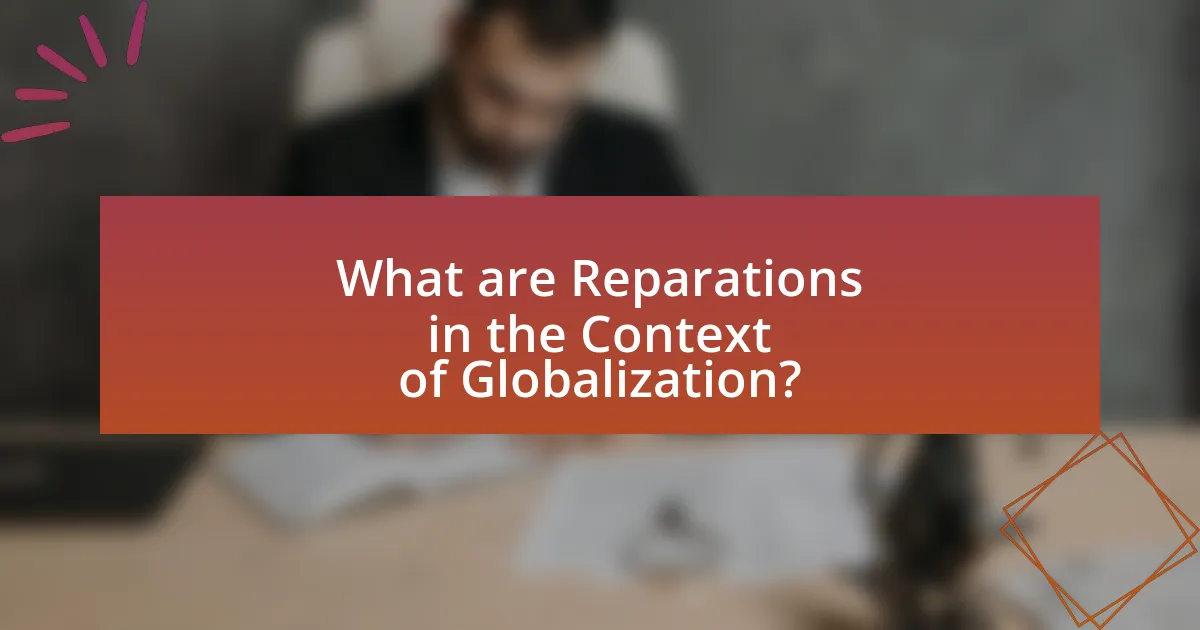
What are Reparations in the Context of Globalization?
Reparations in the context of globalization refer to compensatory measures aimed at addressing historical injustices and inequalities that have been exacerbated by global economic systems. These measures often involve financial payments, land restitution, or social programs directed towards marginalized communities affected by colonialism, slavery, and systemic discrimination. For instance, the United Nations has recognized the need for reparative justice as a means to rectify the socio-economic disparities that persist due to historical exploitation, highlighting that reparations can play a crucial role in fostering equity in a globalized world.
How do Reparations relate to historical injustices?
Reparations are directly related to historical injustices as they serve as a means to acknowledge and compensate for the harm caused by systemic discrimination and exploitation. Historical injustices, such as slavery, colonialism, and segregation, have resulted in long-lasting socio-economic disparities and trauma within affected communities. For instance, the U.S. government’s failure to provide reparations to African Americans after slavery has perpetuated wealth gaps and social inequalities, evidenced by studies showing that Black families have significantly lower wealth compared to white families. By addressing these injustices through reparations, societies aim to rectify past wrongs and promote healing, equity, and justice for marginalized groups.
What specific historical events have led to calls for Reparations?
Calls for reparations have been significantly influenced by historical events such as the transatlantic slave trade, the Jim Crow laws in the United States, and the Holocaust. The transatlantic slave trade, which forcibly transported millions of Africans to the Americas from the 16th to the 19th centuries, resulted in profound social and economic disparities that persist today. The Jim Crow laws, enacted in the late 19th century, institutionalized racial segregation and discrimination against African Americans, further entrenching systemic inequalities. Additionally, the Holocaust, where six million Jews were murdered during World War II, has led to reparations discussions aimed at addressing the atrocities committed and the lasting impact on survivors and their descendants. These events have created a historical context that underpins the ongoing calls for reparations as a means of acknowledging and rectifying past injustices.
How do different cultures perceive the concept of Reparations?
Different cultures perceive the concept of reparations through varied historical, social, and political lenses. For instance, in the United States, reparations are often associated with compensating African Americans for slavery and systemic racism, with discussions emphasizing moral responsibility and justice. In contrast, Germany’s approach to reparations focuses on compensating Holocaust survivors and acknowledging the atrocities of World War II, reflecting a commitment to historical accountability. Additionally, Indigenous cultures in countries like Canada and Australia view reparations as a means to address historical injustices and land dispossession, advocating for recognition and restitution. These diverse perspectives highlight how cultural contexts shape the understanding and implementation of reparations, influenced by each society’s unique historical experiences and values.
Why is the discussion of Reparations relevant today?
The discussion of reparations is relevant today due to ongoing racial inequalities and historical injustices that continue to affect marginalized communities. Current data indicates that systemic racism has resulted in significant disparities in wealth, education, and health outcomes for descendants of enslaved individuals. For example, a 2020 report from the Institute for Policy Studies found that the median wealth of Black families is just one-eighth that of white families, highlighting the long-term economic impact of slavery and discrimination. Additionally, movements advocating for reparations have gained traction, reflecting a growing recognition of the need for restorative justice in addressing these historical wrongs.
What role does globalization play in the current Reparations debate?
Globalization significantly influences the current reparations debate by facilitating cross-border discussions and collaborations among affected communities and nations. This interconnectedness allows for the sharing of historical injustices and the mobilization of international support for reparative measures. For instance, the global movement for racial justice, highlighted by events such as the Black Lives Matter protests, has prompted countries to reconsider their colonial pasts and the implications for reparations. Additionally, economic globalization raises questions about wealth distribution and accountability, as nations with colonial histories are often economically intertwined with their former colonies, complicating the reparations discourse.
How do economic disparities influence the need for Reparations?
Economic disparities significantly heighten the need for reparations by highlighting systemic inequalities that have persisted over generations. These disparities manifest in wealth gaps, access to education, and employment opportunities, which are often rooted in historical injustices such as slavery and colonialism. For instance, a 2020 report by the Institute for Policy Studies revealed that the median wealth of Black families in the United States is approximately one-tenth that of white families, illustrating the long-term economic impact of discriminatory policies. This stark contrast underscores the argument for reparations as a means to address and rectify these entrenched inequalities, aiming to provide financial restitution and promote equity.
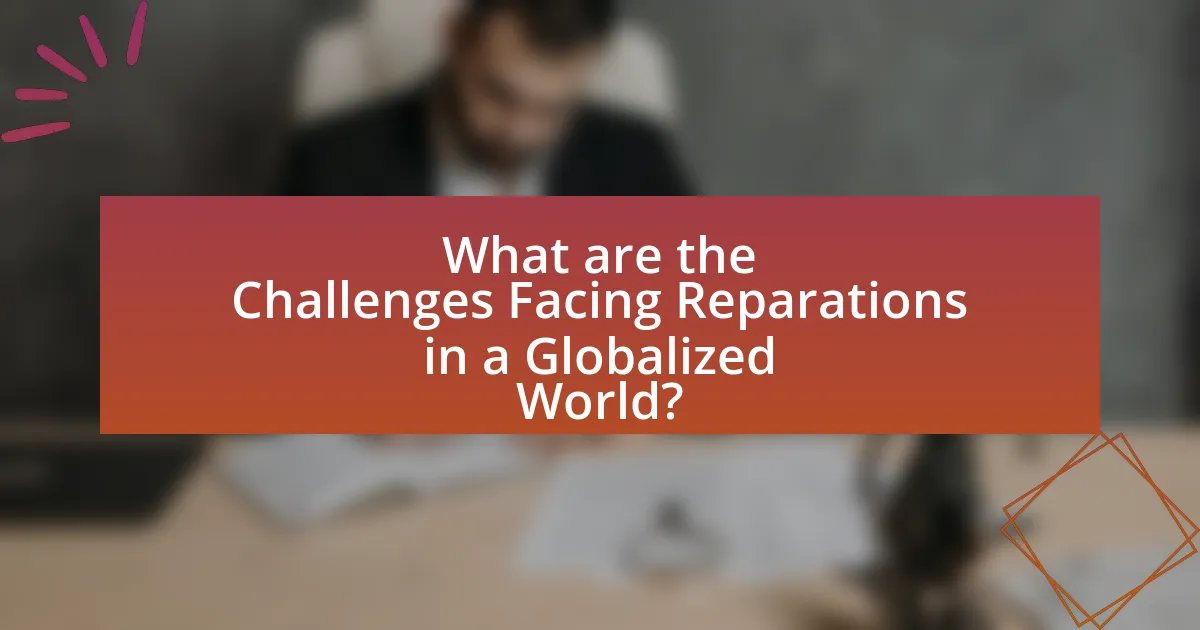
What are the Challenges Facing Reparations in a Globalized World?
The challenges facing reparations in a globalized world include legal complexities, differing national policies, and economic disparities. Legal complexities arise from the lack of international frameworks that govern reparations, making it difficult to establish accountability and enforce claims across borders. Differing national policies complicate the process, as countries may have varying historical contexts and approaches to reparations, leading to inconsistent applications. Economic disparities further hinder reparations efforts, as wealthier nations may resist compensating poorer nations or communities, citing financial constraints or differing priorities. These factors collectively create significant obstacles to achieving effective reparations in a globalized context.
How do legal frameworks impact the implementation of Reparations?
Legal frameworks significantly influence the implementation of reparations by establishing the legal basis for claims, defining eligibility criteria, and outlining the processes for compensation. For instance, countries with robust legal systems can create clear statutes that facilitate reparations for historical injustices, such as the U.S. Civil Liberties Act of 1988, which provided reparations to Japanese Americans interned during World War II. This act exemplifies how legal frameworks can enable victims to seek redress through established legal channels, ensuring accountability and transparency. Conversely, in nations with weak legal structures, the lack of enforceable laws can hinder the reparations process, leaving victims without recourse. Thus, the effectiveness of reparations is closely tied to the strength and clarity of the legal frameworks governing them.
What are the key legal precedents regarding Reparations?
Key legal precedents regarding reparations include the 1980 case of the United States v. Sioux Nation of Indians, where the U.S. Supreme Court ruled that the Sioux Nation was entitled to compensation for the illegal seizure of their land, establishing a framework for financial reparations. Another significant precedent is the 1996 case of the Japanese American Citizens League v. United States, which led to the Civil Liberties Act of 1988, providing reparations to Japanese Americans interned during World War II. Additionally, the 2001 case of the United Nations Human Rights Committee’s decision on the case of the Indigenous Peoples of Canada emphasized the need for reparations for historical injustices. These cases collectively underscore the legal recognition of reparations as a means to address historical wrongs and provide compensation to affected groups.
How do international laws affect national Reparations policies?
International laws significantly influence national reparations policies by establishing frameworks and standards that nations are encouraged to follow. These laws, such as the United Nations Declaration on the Rights of Indigenous Peoples and various human rights treaties, create obligations for states to address historical injustices and provide reparations to affected communities. For instance, the International Covenant on Civil and Political Rights obligates signatory states to ensure effective remedies for violations, which can include reparations. Consequently, nations often align their reparations policies with these international standards to enhance legitimacy and compliance, as seen in countries like South Africa, which incorporated international human rights principles into its post-apartheid reparations framework.
What social and political obstacles hinder Reparations efforts?
Social and political obstacles that hinder reparations efforts include widespread public opposition, political polarization, and the complexity of determining eligibility and compensation. Public sentiment often reflects a lack of understanding or acknowledgment of historical injustices, leading to resistance against reparations initiatives. Political polarization complicates legislative efforts, as differing party ideologies can stall or block proposals for reparations. Additionally, the challenge of establishing criteria for who qualifies for reparations and how compensation should be distributed creates further contention, as seen in debates surrounding the reparations proposals in various U.S. states. These factors collectively impede progress toward implementing reparations.
How do public opinions shape the discourse on Reparations?
Public opinions significantly shape the discourse on reparations by influencing political agendas, media narratives, and public policy discussions. When a substantial portion of the population supports reparations, it prompts lawmakers to consider legislation and funding for reparative measures, as seen in various U.S. cities and states where public sentiment has led to formal proposals for reparations. For instance, a 2020 poll indicated that 76% of Black Americans supported reparations, which has galvanized advocacy groups and shifted the conversation in mainstream media, making reparations a more prominent issue in political platforms. This alignment of public opinion with advocacy efforts creates a feedback loop, where increased visibility and discussion can further shape and refine public attitudes toward reparations.
What political movements are advocating for or against Reparations?
Political movements advocating for reparations include the Black Lives Matter movement, which emphasizes racial justice and economic equity, and various grassroots organizations that focus on reparative justice for descendants of enslaved people. These movements argue that reparations are necessary to address historical injustices and systemic inequalities faced by Black communities in the United States. Conversely, political movements against reparations often include conservative groups and some libertarian organizations, which argue that reparations are impractical, divisive, and unfair to individuals who were not directly involved in historical injustices. These opposing views highlight the ongoing debate surrounding the feasibility and morality of reparations in contemporary society.
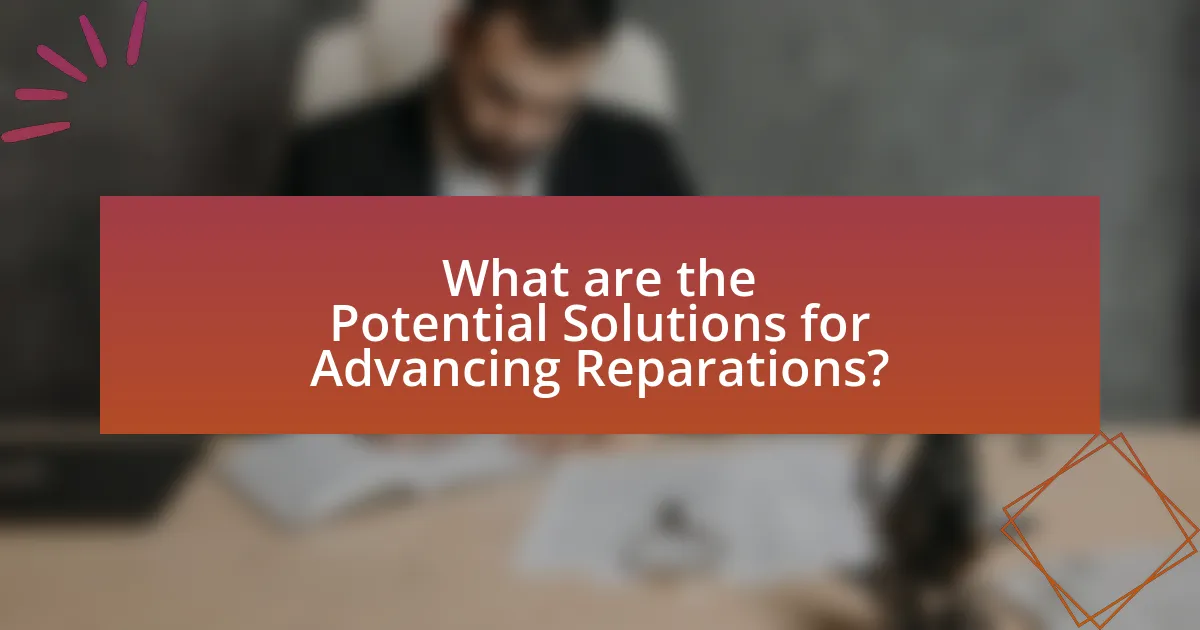
What are the Potential Solutions for Advancing Reparations?
Potential solutions for advancing reparations include implementing direct financial payments, establishing educational scholarships, and creating community investment programs. Direct financial payments can provide immediate economic relief to affected individuals and communities, as seen in the case of reparations paid to Japanese Americans interned during World War II, where the U.S. government allocated $1.6 billion in reparations. Educational scholarships can help address historical disparities in access to education, fostering long-term economic empowerment. Community investment programs can revitalize neighborhoods historically impacted by systemic discrimination, similar to initiatives in South Africa post-apartheid, which aimed to address economic inequalities through targeted investments. These solutions collectively aim to rectify historical injustices and promote equity in contemporary society.
How can international cooperation facilitate Reparations?
International cooperation can facilitate reparations by creating a unified framework for accountability and resource allocation among nations. This collaboration allows countries to share best practices, establish legal precedents, and mobilize financial resources to support reparative justice initiatives. For instance, the establishment of international bodies, such as the International Criminal Court, demonstrates how cooperative efforts can lead to the prosecution of war crimes and the acknowledgment of historical injustices. Furthermore, joint initiatives, like the Global Fund for Victims, exemplify how pooled resources can effectively address the needs of affected communities, ensuring that reparations are not only symbolic but also materially beneficial.
What role do global organizations play in promoting Reparations?
Global organizations play a crucial role in promoting reparations by advocating for justice, facilitating dialogue, and providing frameworks for accountability. These entities, such as the United Nations and various non-governmental organizations, work to raise awareness about historical injustices and the need for reparative measures. For instance, the UN has established mechanisms like the Permanent Forum on Indigenous Issues, which emphasizes the importance of reparations for indigenous populations affected by colonization and exploitation. Additionally, global organizations often support research and documentation efforts that highlight the impacts of past injustices, thereby strengthening the case for reparations. Their involvement helps to mobilize international support and pressure governments to acknowledge and address historical wrongs, as seen in initiatives like the International Criminal Court’s focus on reparative justice.
How can countries collaborate to address historical injustices?
Countries can collaborate to address historical injustices through joint reparative initiatives, truth and reconciliation commissions, and international legal frameworks. Collaborative reparative initiatives can include financial compensation, cultural restitution, and educational programs aimed at acknowledging and rectifying past wrongs. For example, the collaboration between Germany and Israel in compensating Holocaust survivors demonstrates how nations can work together to provide reparations. Truth and reconciliation commissions, such as those established in South Africa, allow countries to collectively confront their histories, fostering dialogue and understanding. Additionally, international legal frameworks, like the United Nations Declaration on the Rights of Indigenous Peoples, provide guidelines for nations to address historical injustices in a structured manner, promoting accountability and cooperation.
What innovative approaches can be taken to implement Reparations?
Innovative approaches to implement reparations include direct cash payments, investment in community infrastructure, and educational scholarships for affected populations. Direct cash payments can provide immediate financial relief and empower individuals economically, as seen in programs like the Alaska Permanent Fund, which distributes annual dividends to residents. Investment in community infrastructure, such as healthcare and housing, addresses systemic inequalities and fosters long-term development, similar to initiatives in South Africa post-apartheid. Educational scholarships can enhance opportunities for marginalized groups, promoting social mobility and addressing historical injustices, akin to the GI Bill in the United States that significantly increased access to higher education for veterans. These approaches collectively aim to rectify historical wrongs and promote equity in a globalized context.
How can technology aid in the distribution of Reparations?
Technology can aid in the distribution of reparations by utilizing blockchain for transparent and secure transactions. Blockchain technology ensures that funds are traceable and immutable, which can help prevent fraud and misallocation of resources. For instance, the use of smart contracts can automate the distribution process, ensuring that payments are made only when specific conditions are met, thereby increasing efficiency. Additionally, digital wallets can facilitate direct payments to beneficiaries, reducing administrative costs and delays associated with traditional banking systems. This approach has been successfully implemented in various financial aid programs, demonstrating its effectiveness in ensuring that funds reach the intended recipients promptly and securely.
What models from other countries can be applied to current Reparations discussions?
Models from other countries that can be applied to current reparations discussions include the South African Truth and Reconciliation Commission (TRC) and the German reparations to Holocaust survivors. The TRC, established in the 1990s, focused on restorative justice and aimed to address the injustices of apartheid through truth-telling and reparative measures, which can inform contemporary reparations frameworks by emphasizing acknowledgment and healing. Similarly, Germany’s reparations program, initiated in the 1950s, provided financial compensation to Holocaust survivors and their descendants, demonstrating a structured approach to reparations that includes both monetary compensation and public acknowledgment of historical wrongs. These models highlight the importance of comprehensive strategies that combine financial reparations with social justice initiatives, which can be adapted to current discussions on reparations for marginalized communities.
What are the best practices for advocating Reparations in the modern age?
The best practices for advocating reparations in the modern age include building coalitions, utilizing digital platforms for awareness, and grounding arguments in historical context and justice. Building coalitions with diverse groups enhances the movement’s strength and reach, as seen in successful campaigns like the Black Lives Matter movement, which united various organizations to advocate for systemic change. Utilizing digital platforms, such as social media, allows advocates to disseminate information rapidly and engage a broader audience, exemplified by campaigns that have gone viral, raising awareness and support for reparations. Grounding arguments in historical context, such as referencing the 40 acres and a mule promise to formerly enslaved individuals, provides a factual basis for claims and emphasizes the ongoing impact of historical injustices. These practices collectively create a robust framework for advocating reparations effectively in today’s globalized society.
How can grassroots movements effectively push for Reparations?
Grassroots movements can effectively push for reparations by mobilizing community support, raising awareness, and advocating for policy changes. These movements often utilize social media platforms to disseminate information and engage a broader audience, exemplified by campaigns like #BlackLivesMatter, which have successfully highlighted systemic injustices and garnered national attention. Additionally, grassroots organizations can collaborate with local leaders and policymakers to create actionable proposals for reparations, as seen in the case of the 2020 reparations task force established in California, which aims to address historical injustices against Black residents. By leveraging community organizing, education, and strategic partnerships, grassroots movements can create a compelling case for reparations that resonates with both the public and decision-makers.
What strategies can be employed to educate the public about Reparations?
To educate the public about Reparations, strategies such as community engagement, educational campaigns, and leveraging digital platforms can be employed. Community engagement involves organizing workshops, town hall meetings, and discussions that allow individuals to share their experiences and learn from experts in the field. Educational campaigns can include the distribution of informative materials, such as pamphlets and articles, that outline the historical context and current relevance of Reparations. Leveraging digital platforms, including social media and online webinars, can broaden the reach and accessibility of information, allowing for diverse participation and dialogue. These strategies are supported by research indicating that informed communities are more likely to engage in advocacy and support for Reparations initiatives.
